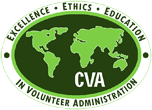Links on this page go either to PDF documents (get Adobe Acrobat Reader for free)
or to other websites on the Internet (close the new window to return here)

The Council for Certification in Volunteer Administration (CCVA) has had oversight of the international CVA credential since 2006. Read on to join the ranks of committed, ethical volunteer engagement professions across the globe!
CCVA currently offers the test twice a year:
- By March 1: register for spring testing window, pay fee (in 2023: $400)
- From April 1-14: take the test online
- By September 1: register for fall testing window, pay fee (in 2023: $400)
- From October 1-14 – take the test online
The entire process is outlined here: How to become Certified in Volunteer Administration (CVA) (cvacert.org). If any of the links below don’t work, they can all be found on the www.CVACERT.org website.
These tips and suggestions should help you successfully take the exam:
- Join a study group in person or by Zoom. We found that having colleagues to cheer and encourage is a huge part of being confident, prepared, and successful! (To find a group, email Michele Baker, CVA at dovia.michele@gmail.com and ask about a current study group.)
- Join one of CCVA’s information session webinars to get all the details about the credential, the testing process and timeline. See a calendar of info sessions here.
- Follow the CCVA’s public Linked In page and the CCVA’s public Facebook page to find others across the USA, Canada, and the globe who are taking the test. Interact. Ask questions. Make friends!
- Take the Self-Assessment to see where you might need information or there are gaps in your knowledge.
- Go ahead and fill out the Document of Eligibility (instructions and form).
- Thoroughly read the 15-page Handbook (get it here) & thoroughly review the Body of Knowledge pages contained in the Handbook.
- As a supplement to your education, review the textbook, “Volunteer Administration: Professional Practice” (any edition). DOVIA has two copies – ask to borrow one, or you may buy one here ($110). The test is not taken directly from the textbook, although there are questions drawn from concepts in the book. Read it as additional information to add to what you already have from your own experience.
- Again as a supplement, buy & read the e-book version of Susan Ellis’s “From the Top Down” ($14 – get it here)
- Look at the resources under “CCVA Resources” and “Becoming a CVA” on this page: Resources: CVA Resources and Media (cvacert.org)
- Talk to volunteer managers in other fields so you get multiple versions of any one idea – remember, this test is international and intended to assess universal/general knowledge that would be constant among both a 2-year newbie in Mississippi and a 25-year seasoned leader in Toronto. Try to find the underlying connections between different approaches and see where they fit in the Body of Knowledge. For example, if you work in health care, talk to managers of volunteers in schools, faith-based organizations, or social service agencies. Find the commonalities.
- Look over the Sample Exam Questions.
- Final tip: Don’t wait until the very last minute to take the test. It is an online test, and you may take it from anywhere where there is internet access. It is self-proctored: your camera watches to make sure your eyes are on the screen (and not on your notes or the book, for example).
Feel free to email Michele Baker, CVA (dovia.michele@gmail.com) or Elizabeth Coleman, CVA (elizabethcolemancva@gmail.com) for information, to ask questions, or to get support. We are here to support and help – good luck!
Remember the March 1 and September 1 application deadlines…
